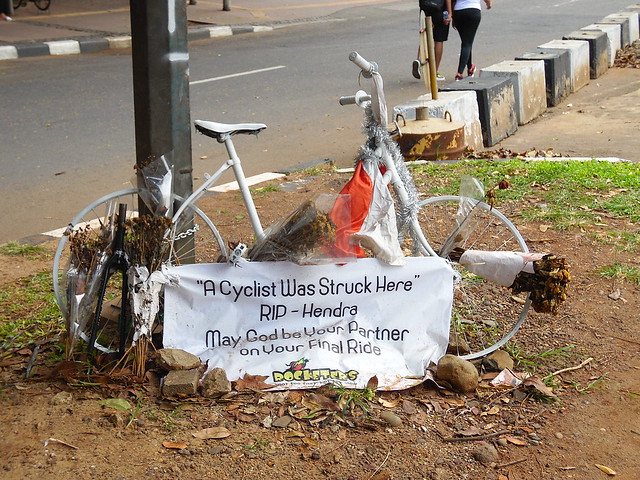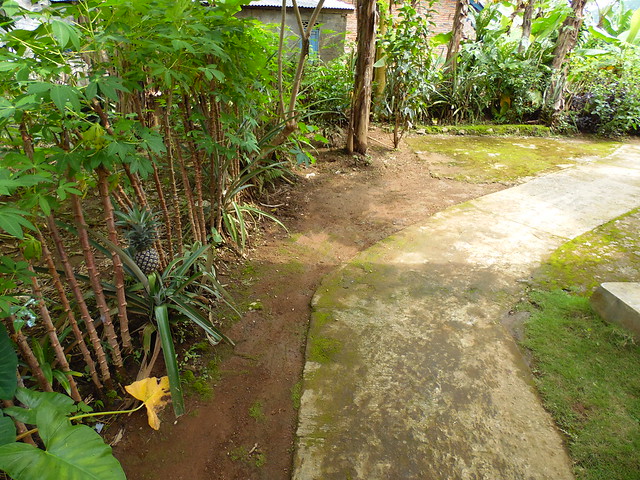Fred went a wandering.
Last activity 22 March 2022 by Ubudian
212685 Views
1500 replies
Subscribe to the topic
Post new topic
Geoffwhere wrote:And, sadly, empty!
The driver, a very friendly chap, was on his break so the bus wasn't in service at the time.
It had gone when I passed a few minutes later.
The big holiday season has come and gone, and so have all the tourists from the major resorts, but they left their rubbish.
This scene was pretty much the same at every rest stop and a good few of the beach side parking areas and markets.
There's little by way of local habit here as far as throwing rubbish in bins is concerned, and very few bins anyway.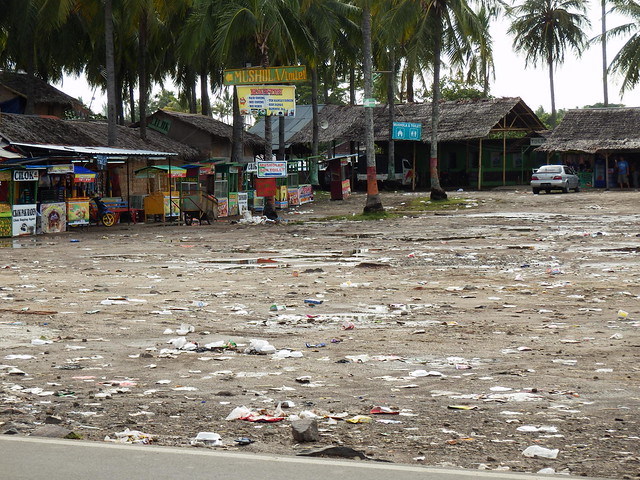
Fred, here in Bali we see images such as your last one all the time...normally right after a large temple ceremony.
The question I have is, how soon after is the mess cleaned up?
For example, given a similar view in Bali, within a day (at most), the mess has been swept up and discarded.
Do you expect the same?
The clean up had already started, but only by guys collecting card and plastic bottles. The serious cleaning up will have happened by now.
OK, good…Jakarta sama, sama Bali…clean ups are quick.
I think it’s important to stress this because as one surfs the internet there are lots of photos presented which look like your last shot…and those photos (like yours) were most likely taken right after the “event.”
However, and all too often, those photos are presented as something one should expect to see here on a regular basis (little or no clean up). A good example, aside from ceremonies and events, would be shots of various beaches on Bali taken shortly after a storm.
I don’t know the customs in Java anywhere as well as you, but here in Bali, cleaning (sweeping) goes on in virtually every compound, and in most all public areas, at least twice a day...very early AM and before late PM.
What is different in our adopted culture (Indonesia) is that trash is often simply dropped on the ground (even in Balinese compounds) as opposed to immediately placing the trash in some sort of receptacle (garbage or trash bin). But, the trash doesn’t last long on the ground before it’s swept up and discarded.
Sometimes I find this issue to go beyond trash and center on personal hygiene. What I mean by that is the occasional comments I hear from some newly arrived visitors along the lines of, “don’t these people ever take a bath?”
The custom in Bali is to mandi (bathe) at least twice a day…three times if the person is going to any sort of ceremony or temple. While heavily perfumed deodorants are not the norm here by any means, bathing, and a respect for cleanliness, is something I’ve noted as being very much a daily part of life in Indonesia.
Many people have no access to piped water, so wells are very common here.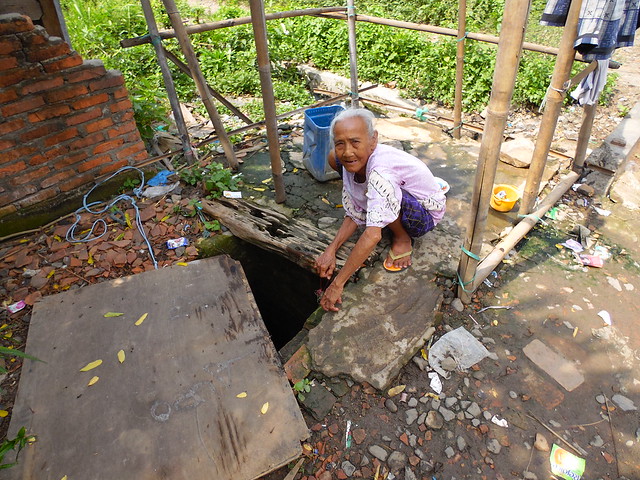
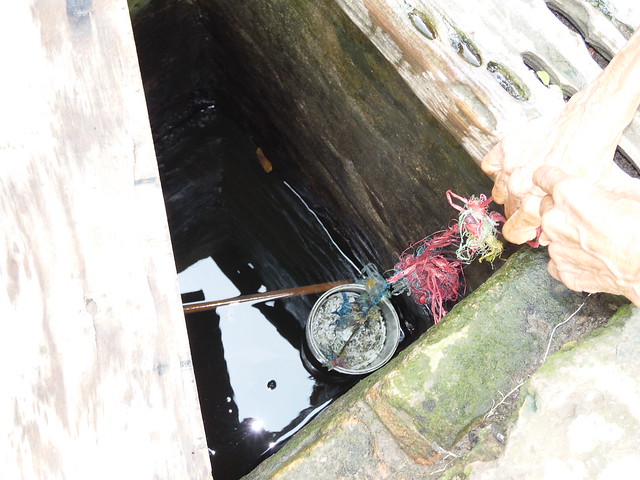
The same goes for toilets, many people have no proper sanitation.
A house ... sort of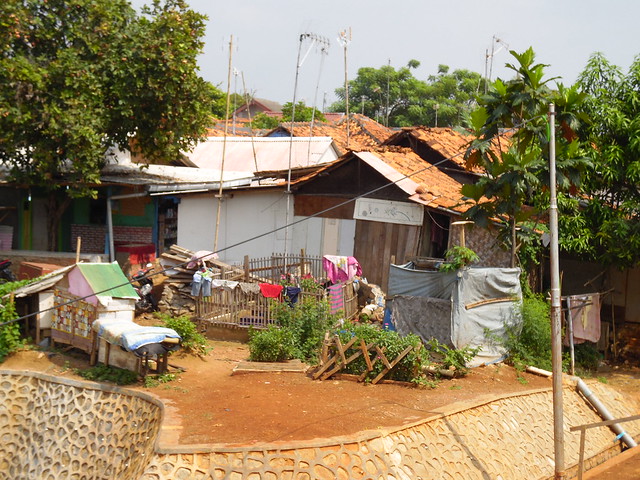
The toilet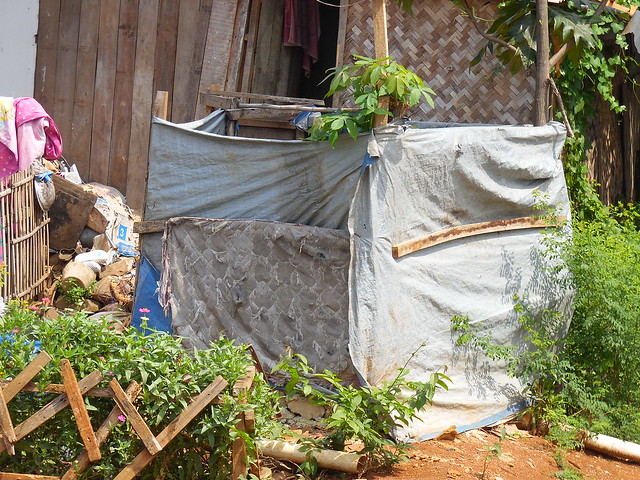
Some are even worse.
The drain is the river.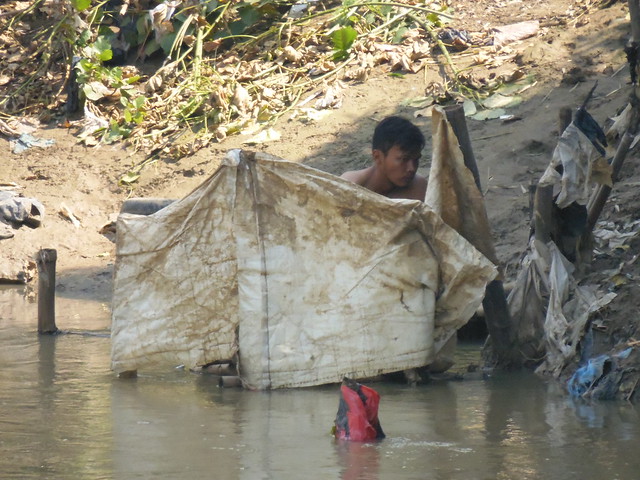
Surely the question should be, why do people just drop their waste in the first place and expect that, by some miracle deed performed by someone else, the rubbish will be removed and deposited in an appropriate location?
The gross carelessness is palpable and the arrogance of people who do this is shameful.
No good is done by papering over their bad behaviour by accepting that it will be picked up by 'someone else' after a few hours/days.
Whilst I recognise that this is an entrenched 'cultural issue', that doesn't excuse it and, in my opinion, this is something that will continue to hold back Indonesia's perception by those who have come to realise that rubbish left behind is unacceptable.
Decades ago, in my home country Australia, we had the same problem (although with a smaller population, not of such a huge magnitude) and the efforts of one individual, Iain Kiernan, through what has become a world wide phenomenon that originated as 'Clean Up Australia', the community at large is aware of and helps solve the littering problem.
Today, it's normal practice to walk a few meters to the nearest garbage bin and 'drop it in'.
The beginning here in Indonesia could be as fundamental as not excusing the practice in the first place by accepting that 'someone' will clean it up later.
The lady of the well was outside a house who's owners have a little cottage industry going.
People here who are unable to find work or feel they can do better by starting a micro business conduct a variety of trades, this one making fish food.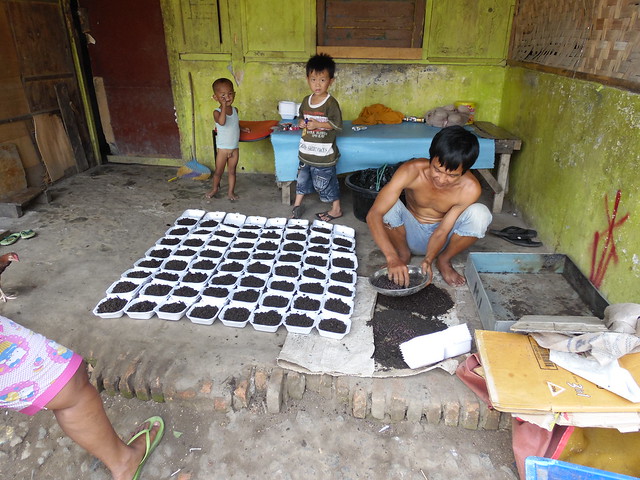
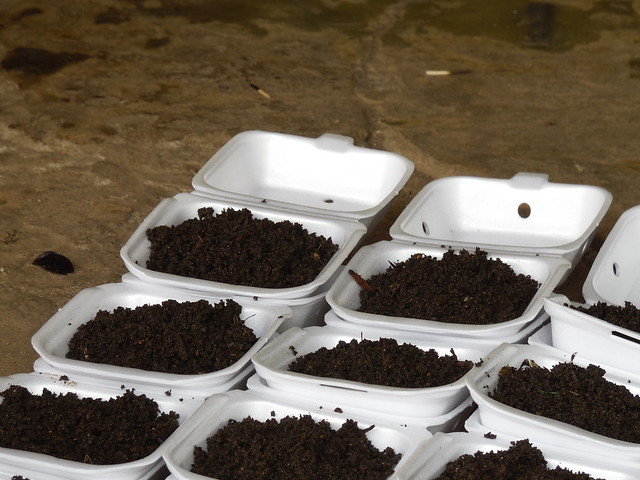
This attitude to work and their determination to look after their families strengthens my admiration for the Indonesian people.
Another very interesting cottage industry is this one. I discovered this place the same day as the fish food.
The old way of calling Muslims to prayer was a drum as well as the vocal call. The drums were louder than the voice so would attract more attention over a greater distance. Many mosques still use the drum, and many more keep one as a nod to the past
[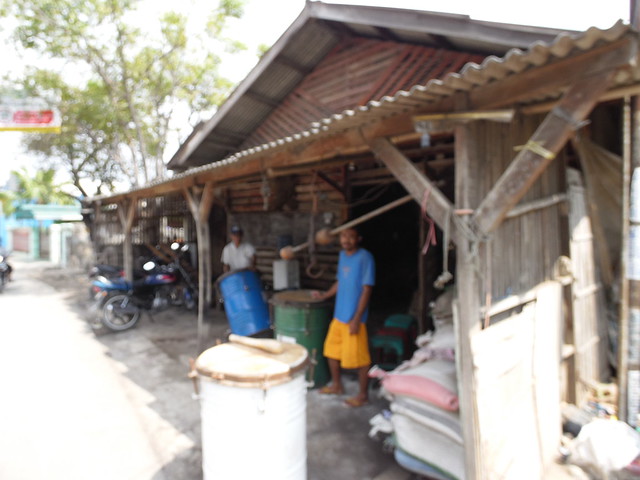
Goat skins are used as the cover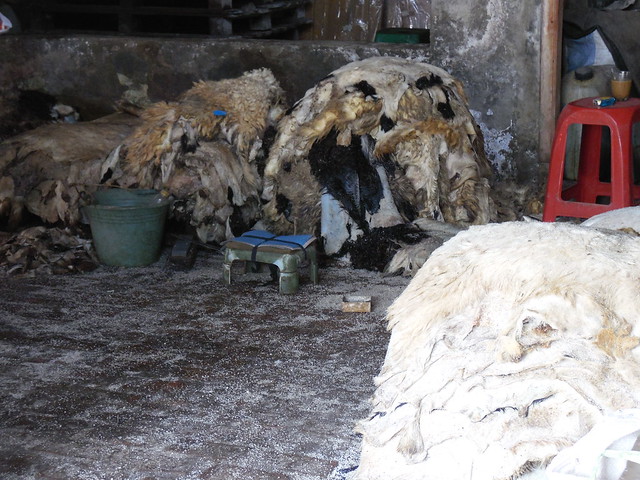
and old oil drums as the soundbox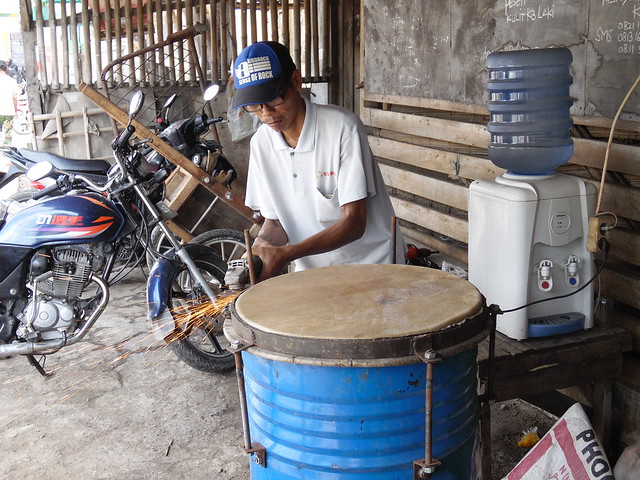
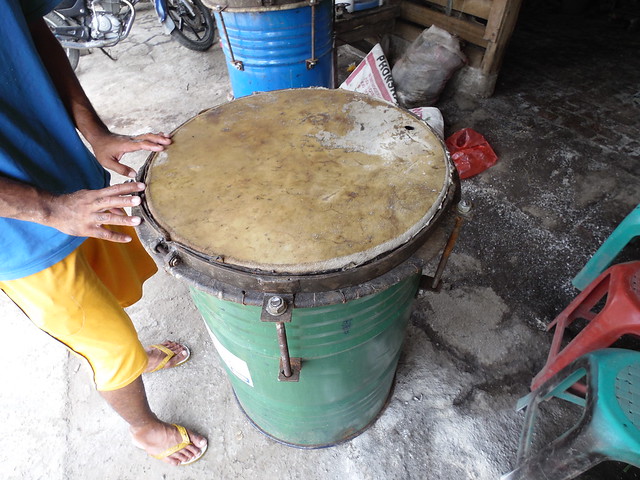
Back to those oil drums ...
Wandering around a village in Bintaro the othr day saw me pass a mosque, and guess what they had.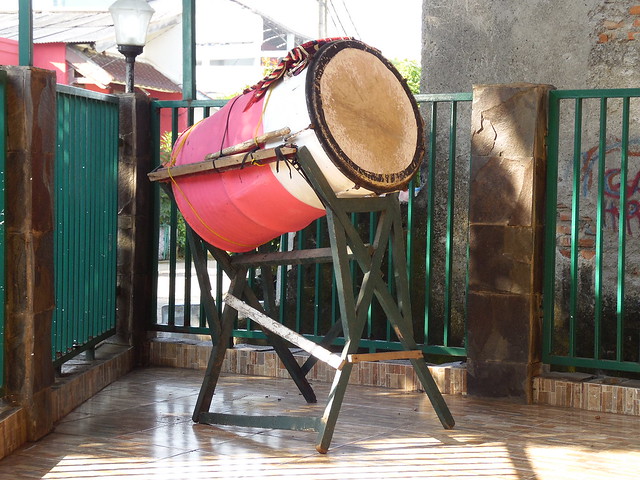
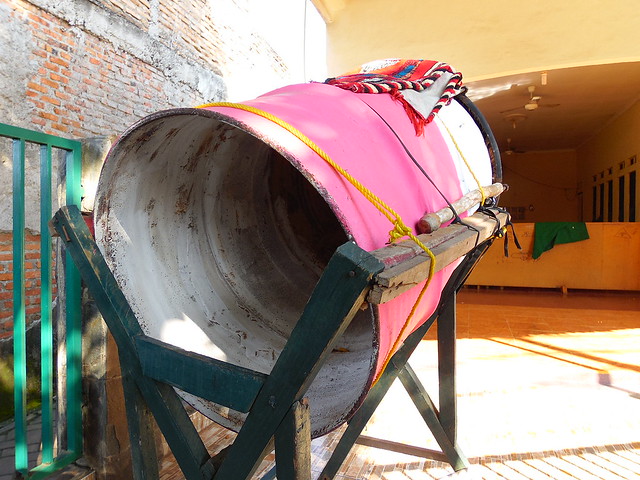
As Indonesia becomes richer, many people are under stress and need to get things done in a rush, often trying to combine essential household tasks whilst doing other things.
This guy is washing his clothes on his way to work.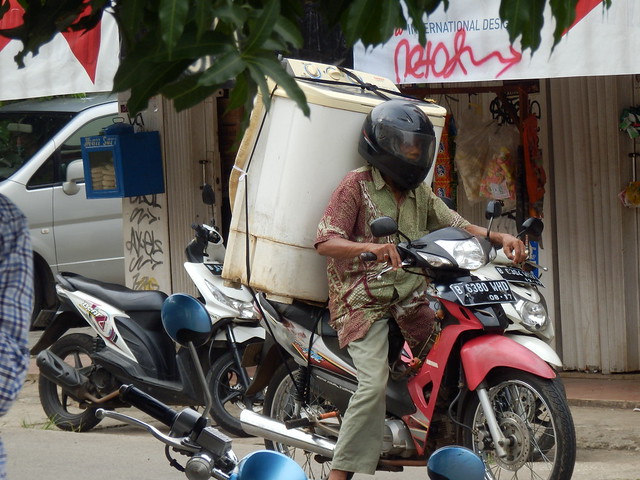
Safety first, but anything is fine if it works.
You have to love Indonesian roads.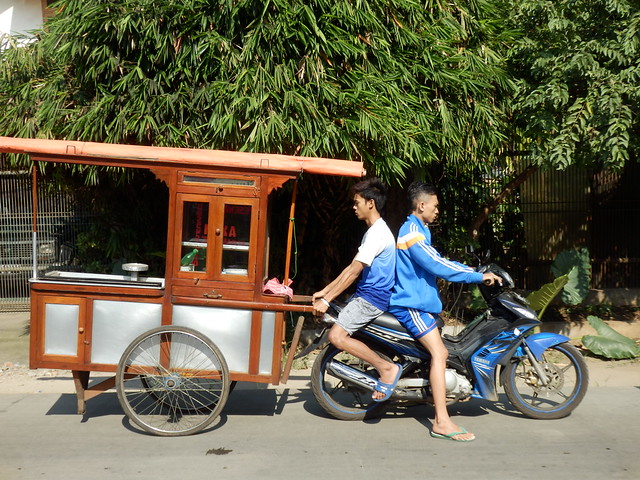
Indonesia became an independent country on the seventeenth of August 1945, but the Dutch didn't like that so they tried to keep it. A series of events including the amazing bravery of Indonesian fighters sent the Dutch packing and this is well and truely fixed in Indonesians' hearts.
There is a national holiday for all, ceremonies everywhere and parties for everyone, but that needs a little cash.
Collecting cash is done in a lot of ways.
These dudes plonked a chair in the middle of the road and started to wave down cars in the hope of a little cash ... probably/possibly for their local event ... maybe.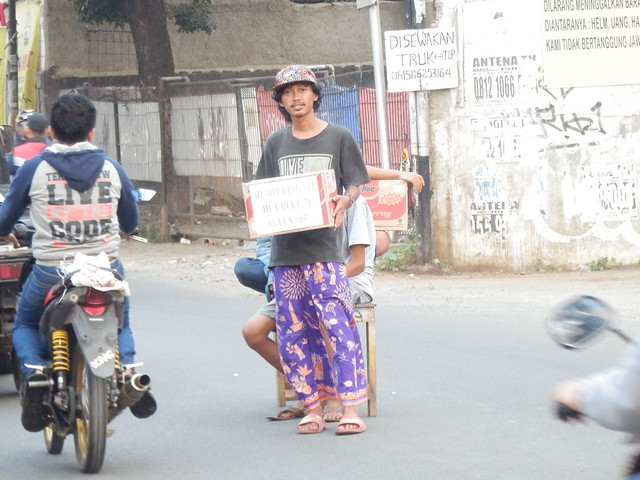
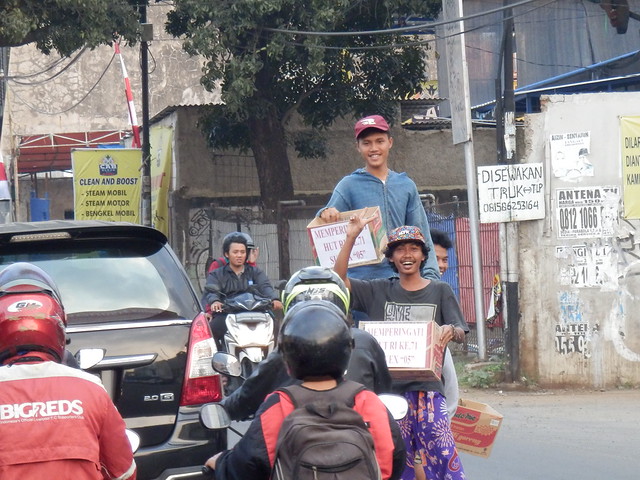
As a little side note, I like the way Indonesian nationalism works. Anyone is welcome as long as they're positive to Indonesia, and that attitude is almost universal. The nationalism here is mostly about working together to make Indonesia the best it can be; very different from what nationalism has become in some places.
I like Indonesia - a lot.
Jakarta isn't Paris, but it does have a wide range of street cafes.
I was waiting for my police criminal record check to be done, so I went for a little jaunt.
It doesn't matter where you go, there are hundreds of places to choose from.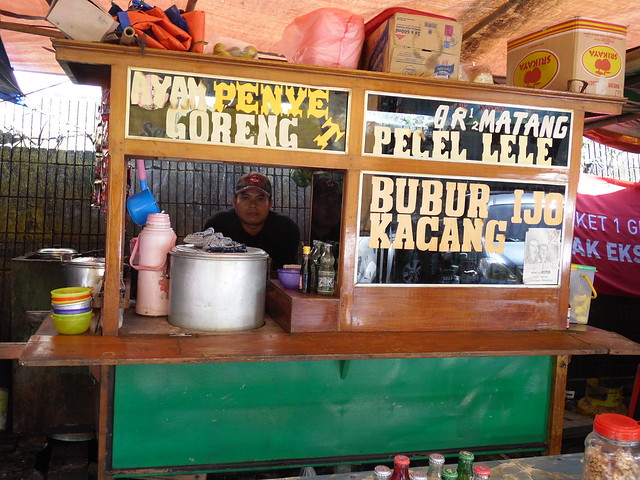
These are either sponsored or owned by someone with political interests.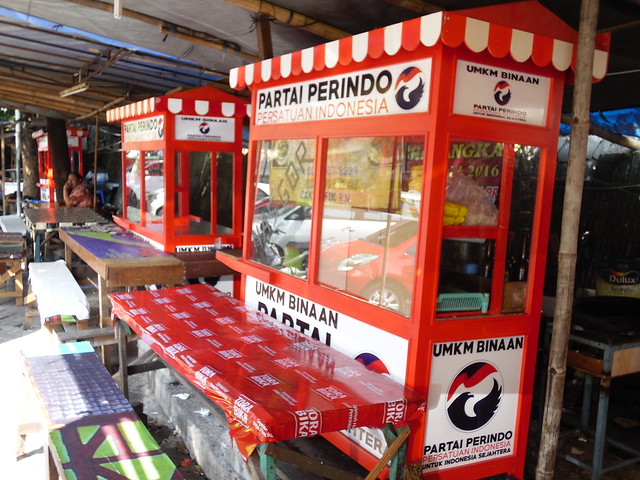
Protection from the sun and the rain is important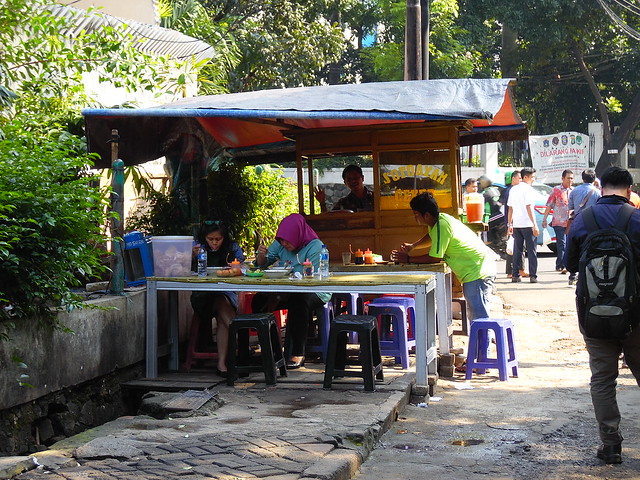
I'll bet Paris doesn't have these.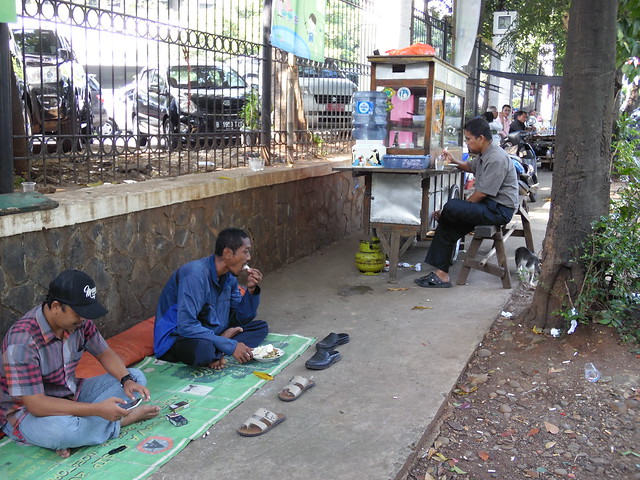
Washing the dishes properly is important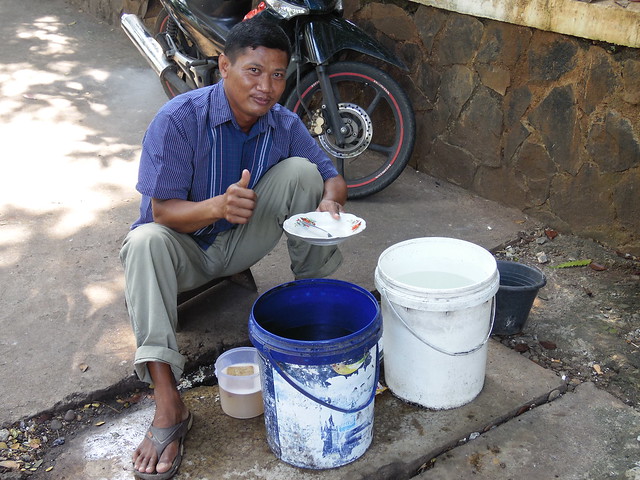
Gorengan (Fried snacks) and sold all over Indonesia in shops and little street stands.
This old guy wanders around Bintaro selling his food, as he has done since I first moved to this area, and as he probably will do until he's unable to walk.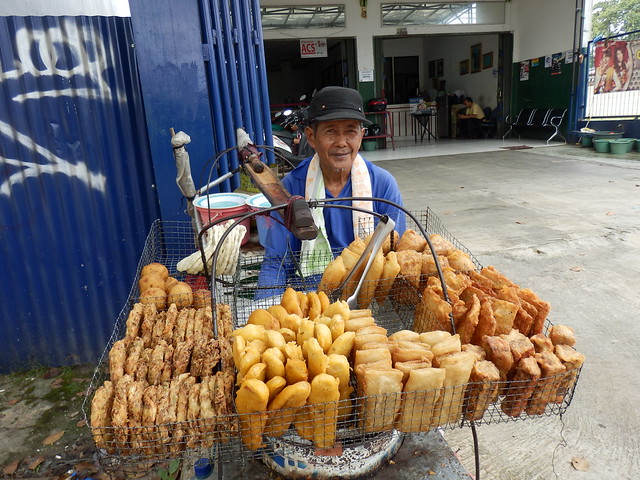
Indonesian are very proud of their country and that's something that shows up especially well on independence day (17 Aug).
Every city, town and village has celebrations that includes kids' games and a whole host of things for everyone.
This is a field near Pondok Aren police station, and the site of what will be a record attempt for the number of Indonesian flags raised by married couples.
They're aiming at over a thousand flags going up.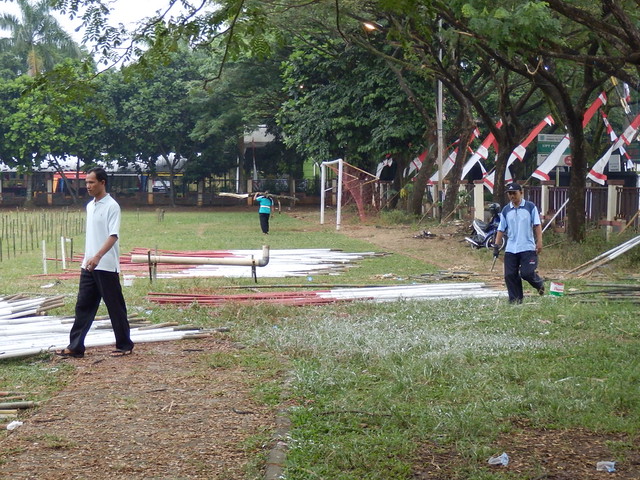
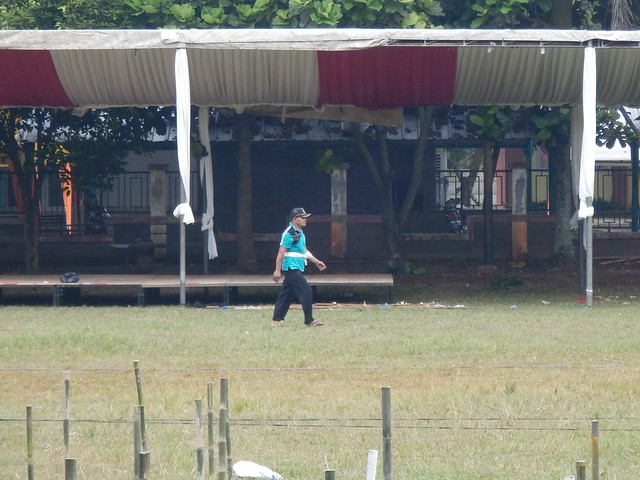
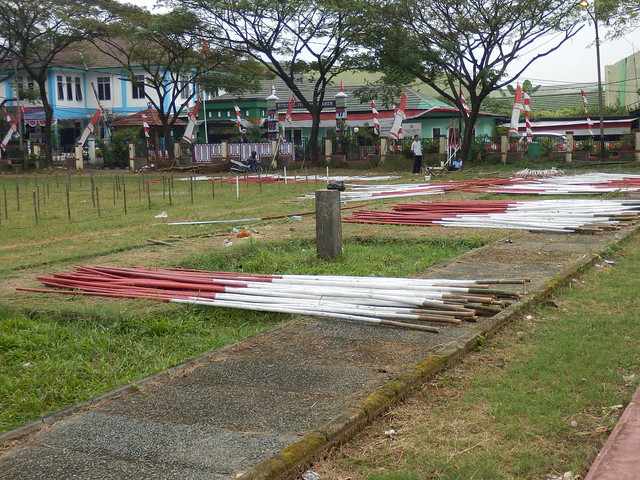
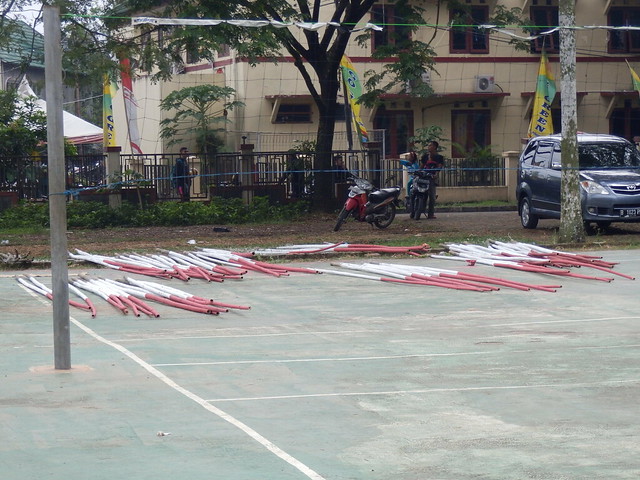
Tap water isn't drinkable here so everyone with enough money buys bottled water in containers known as 'gallons'. They people who sell water commonly also sell cooking gas as there is no gas network here.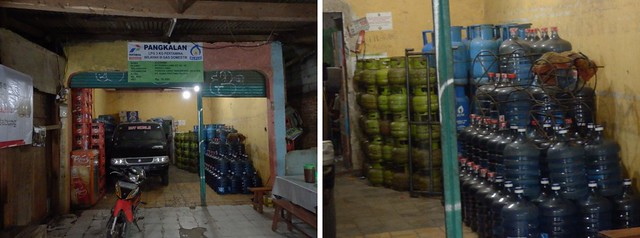
Out for walk but your shoe breaks - No problem in Indonesia
These street shoe repair micro-companies are easy enough to find.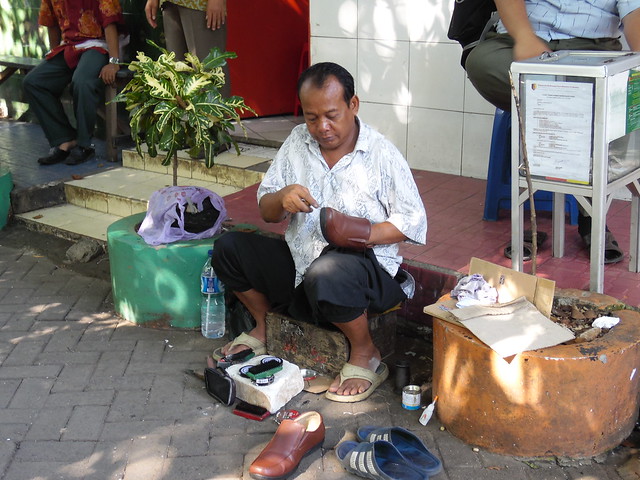
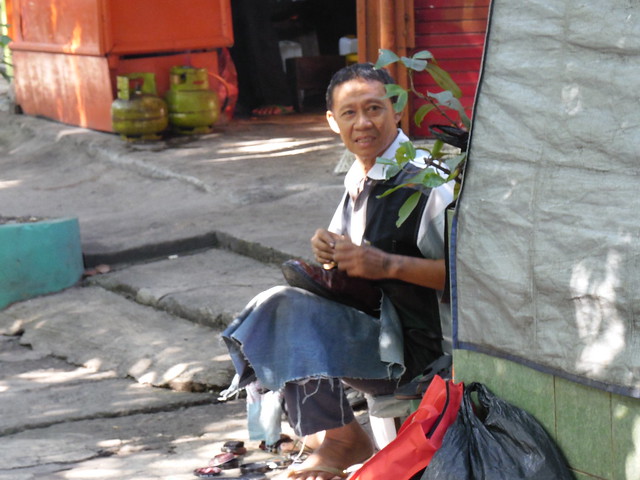
Anyone who has been to Meadowhall shopping centre in Sheffield will look at these and think they've seen them before, but can't quite place them.
This top quality shopping centre in Karawaci, Tangerang was based on the Meadowhall design but given a serious boost. The 'Oasis' is a little bigger and has a wild variety of local and international food ... oh, and a funfair.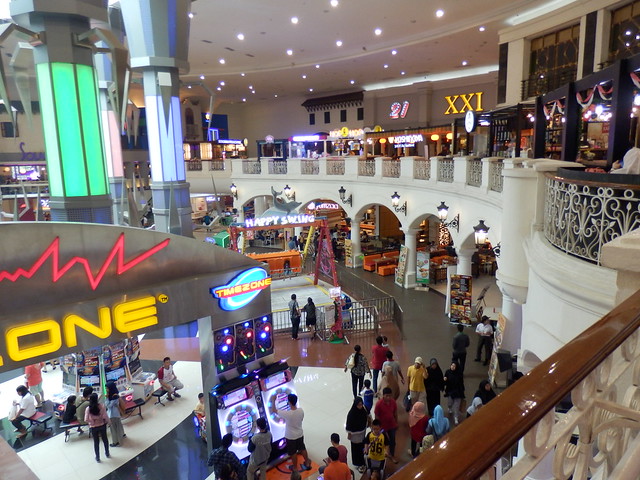
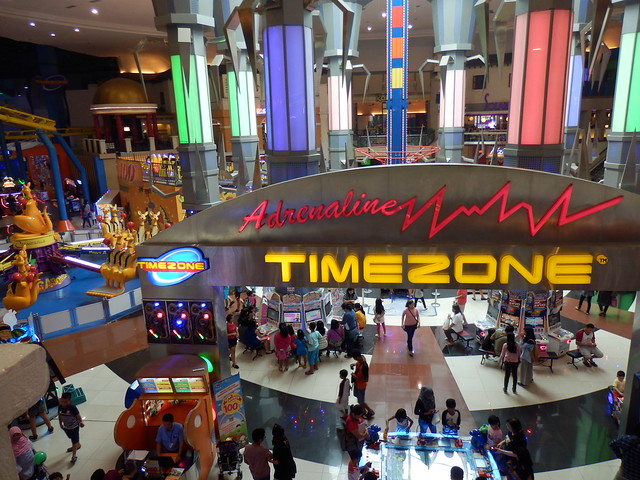
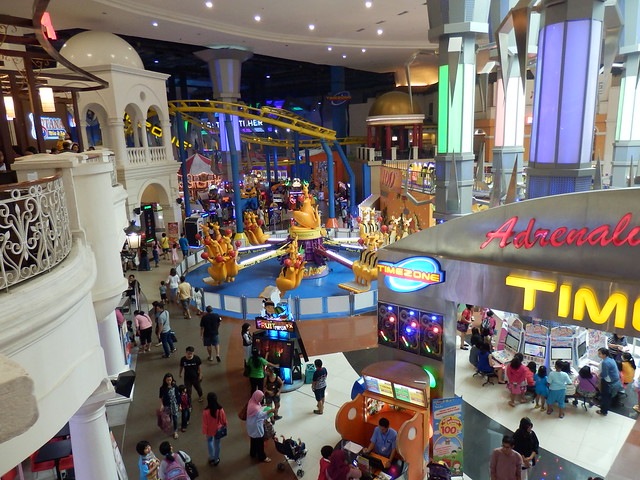
They put on shows and competitions as well, this being typical of the sort of stuff they do. These girls are doing a traditional Indonesian dance, and doing it very well.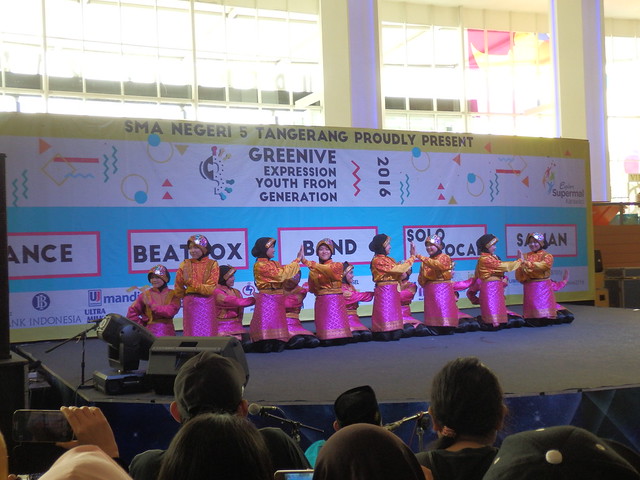
Supermall has a very sweet technology area covering three wonderful floors with enough tech toys to keep the most serious nerds busy for hours.
This excellent shopping centre is well worth a visit
http://www.supermalkarawaci.com/
August 17 is almost with us, so that means last minute making sure all will go right for the flag ceremonies tomorrow morning.
I passed the guys on my way home. (sorry about the poor quality, only had my phone with me)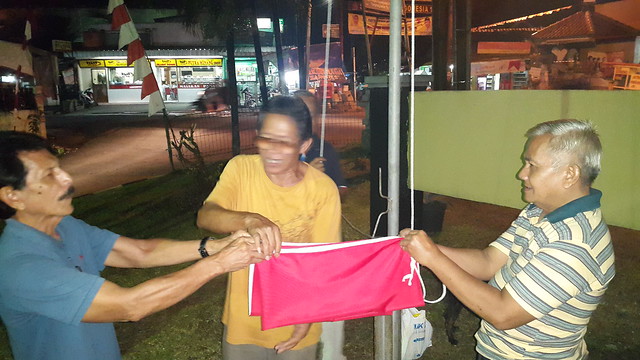
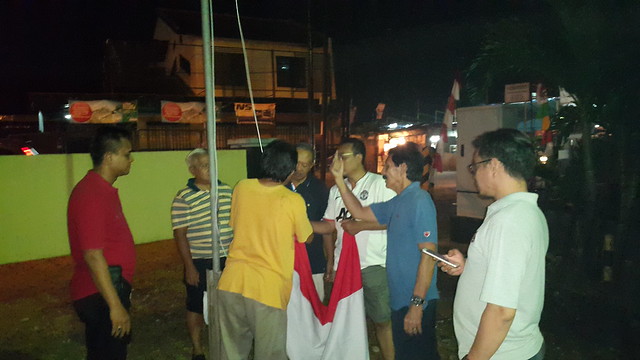
Machinery can be difficult to find and expensive to hire, especially the latest underground cable laying stuff, but unskilled workers are cheap and there are loads around.
These guys are shifting dirt with basic tools in order to dig holes for new electricity cables.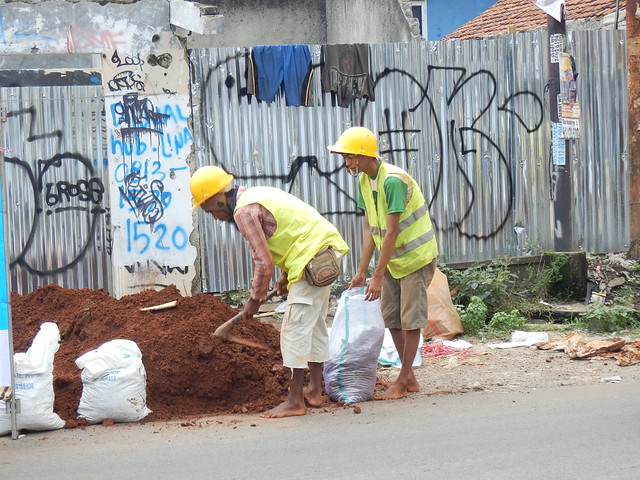
The guys have to manually pull the cables through, their job being hard and dirty. (Sorry about the poor photo lighting, the sun was in exactly the wrong place)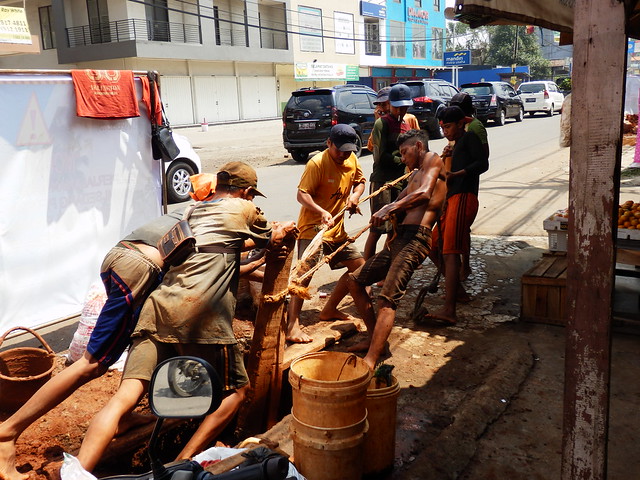
But there's a hole...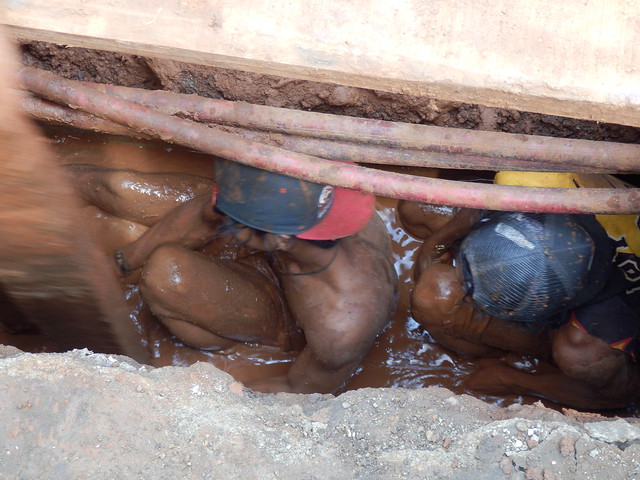
and a couple of dudes have to sit in it to keep the cables moving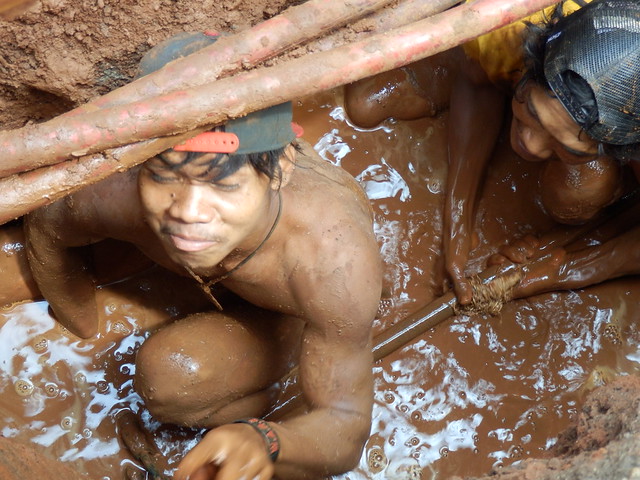
As with any really dirty job, full bathroom facilities are provided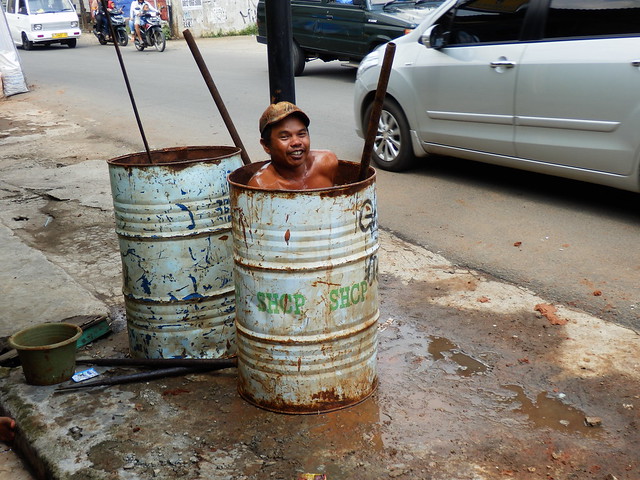
Some people ask if the subjects in my photos mind being snapped - No worries, it's a lot harder to get past without taking a snap than it is to take them. Indonesians tend to be very friendly, open people, and they generally love a bit of fame.
Have some proof. 
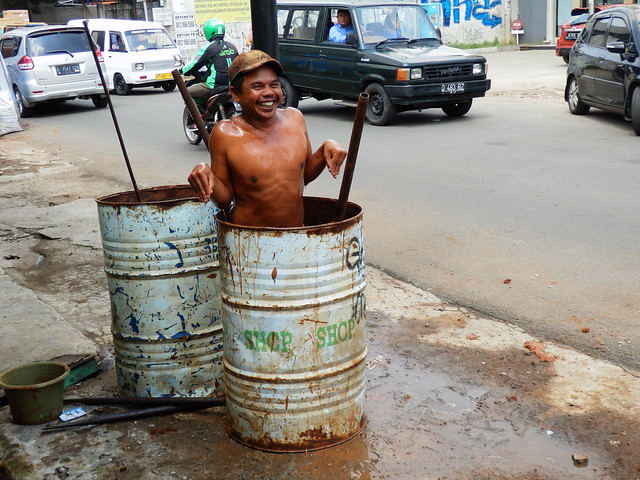
Independence day is over and some of the flags are already being taken down and stored for next year, but people often put the bamboo poles to one use or another.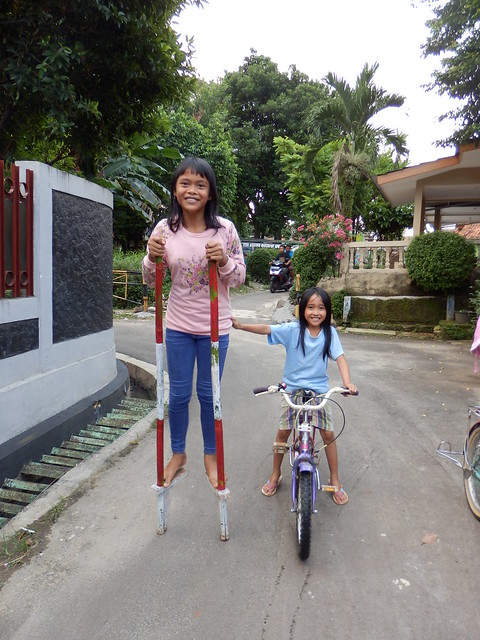
I rarely don;t have a camera with me as I commonly regret not having one available when I miss a photo. This was one of those rare occasions when I only had a Samsung phone to use so the quality isn't great and the smoke didn't help.
Street vendors will cook with any means possible, and that can include a makeshift open fire if what they're cooking isn't their usual menu.
Fish anyone?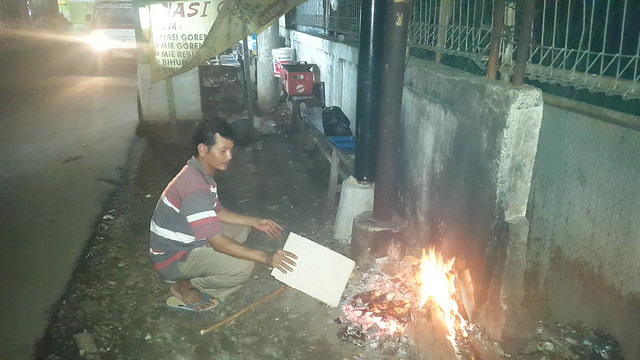
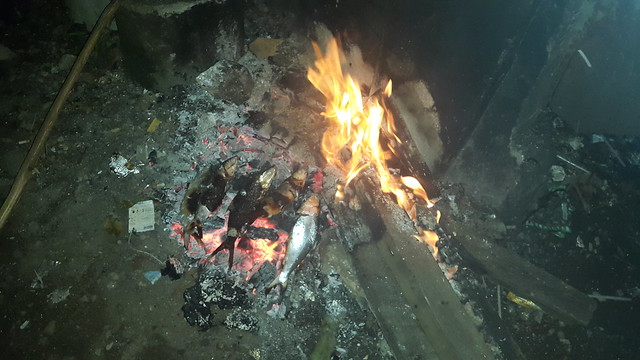
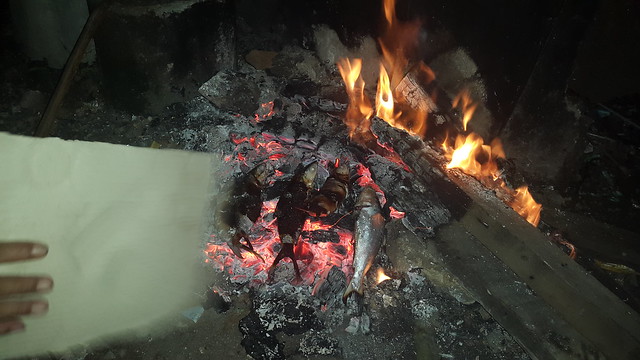
psb43 wrote:he has some nice hot coals going there, did you try the fish?
I'd just got back from an art exhibition in Jakarta and I was a lot more interested in getting to bed.
When you want a document here, you have a few steps to follow.
The local head and area head come first, them you go to the local office to get the letter you actually want. 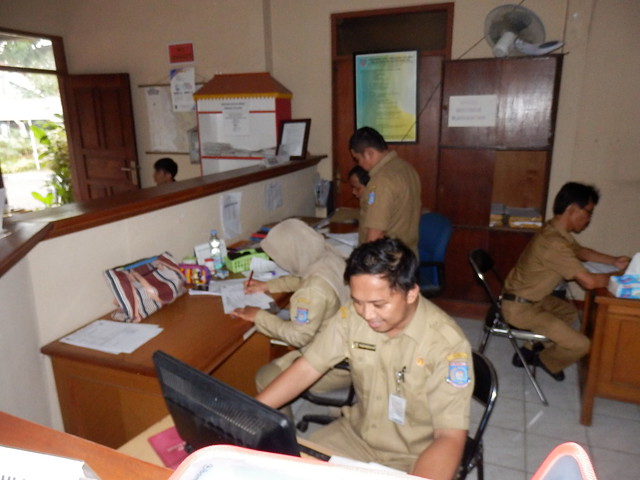
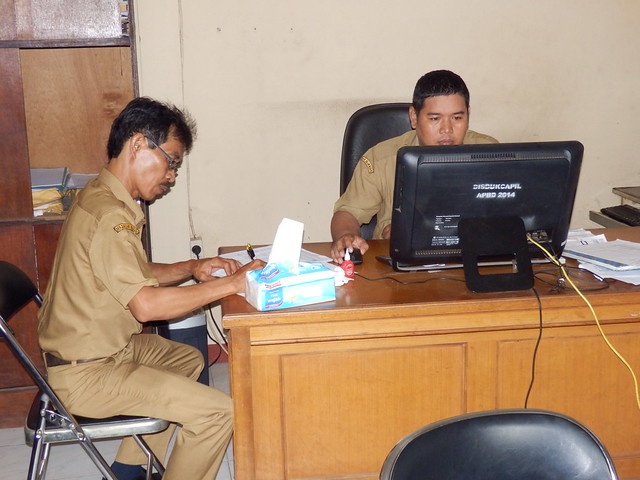
If it's an ID card or very serious letter, there's an other stage to get through (At least for foreigners)
The main office for the area is where to go for that sort of thing, and get there early or you'll commonly have a long wait. My last visit got me there before the office opened, so I watched the roll call. This sort of thing is pretty much normal for government offices in Indonesia, and a lot of other places as well.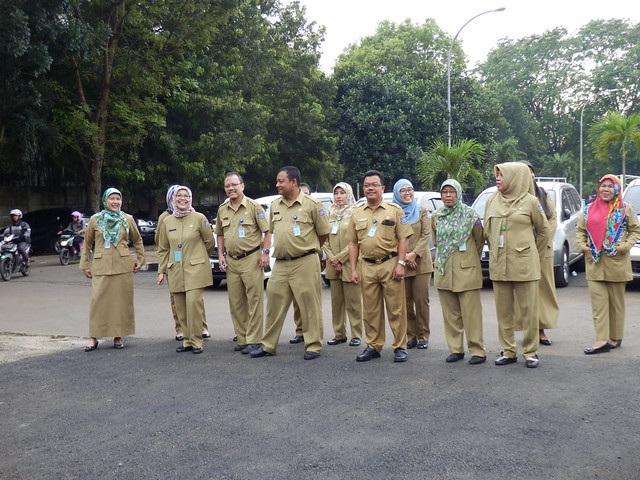
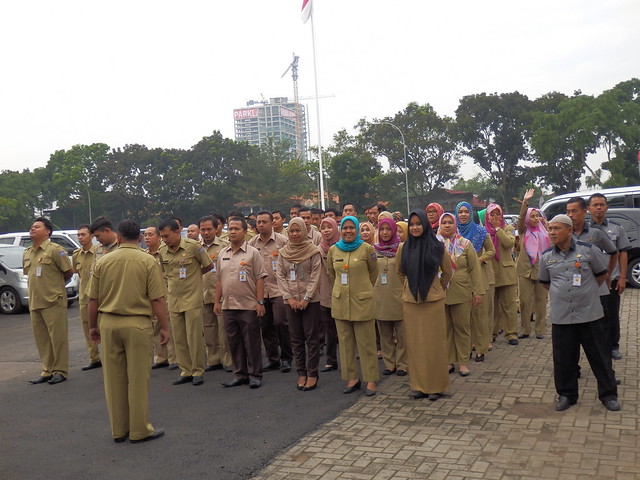
One of the greatest things about Indonesia is its people.
They're pretty much all amazingly friendly, as demonstrated by these taxi drivers.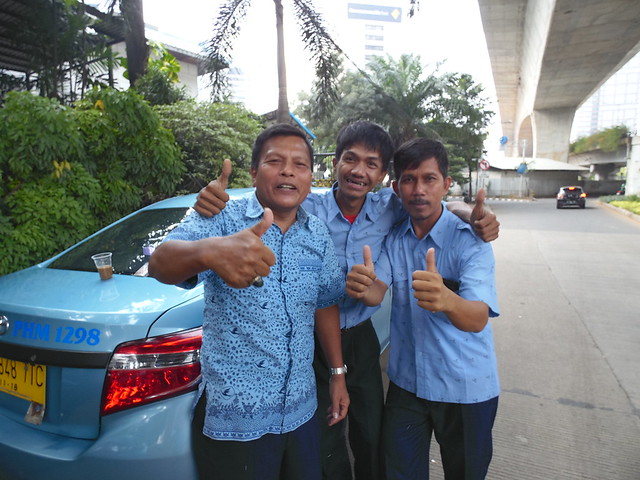
Hundreds of years of occupation left Indonesia with a sour taste in its mouth, and a fiercely protective attitude towards the country. I see the point and agree with it.
That makes a difference to foreigners here in that they can't buy land, but they can buy apartments when no land is included in the sale.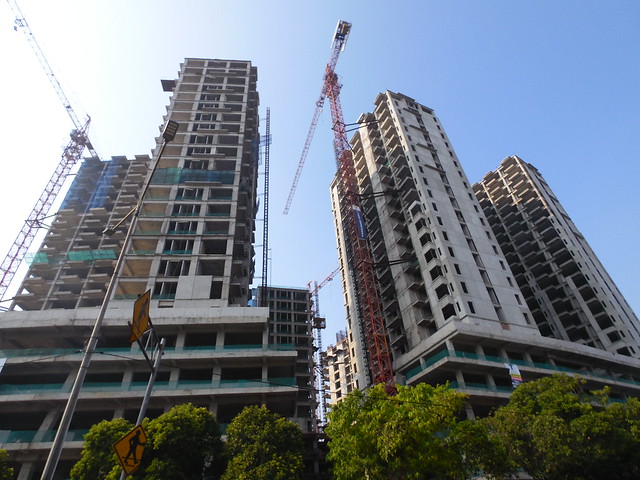

I wonder how many people walk past the cart but never wonder who it belongs to.
His work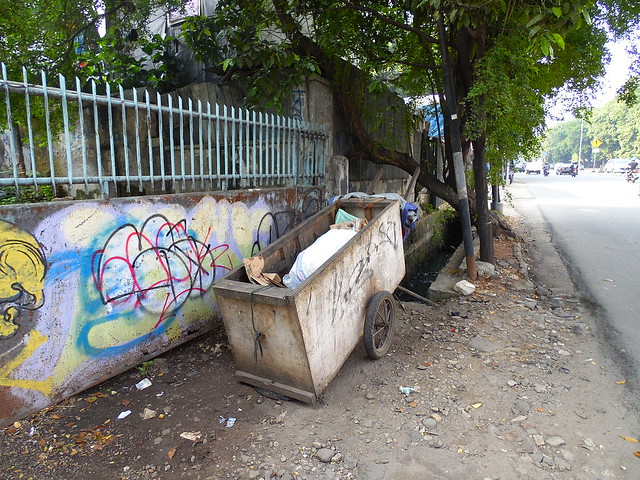
His bed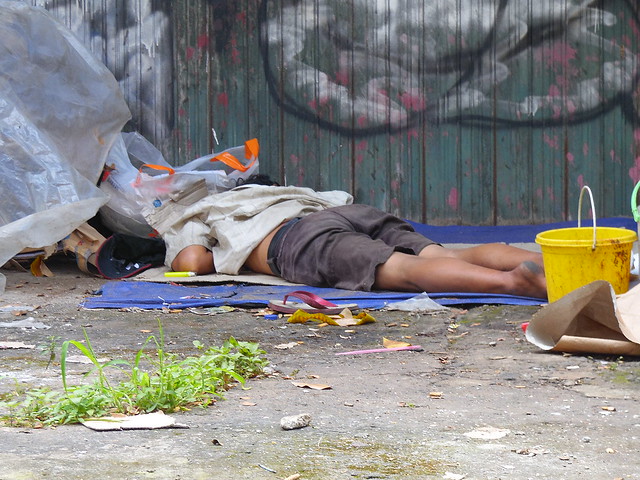
A family business.
This is quite a common sight here, but so many people don't want to see it.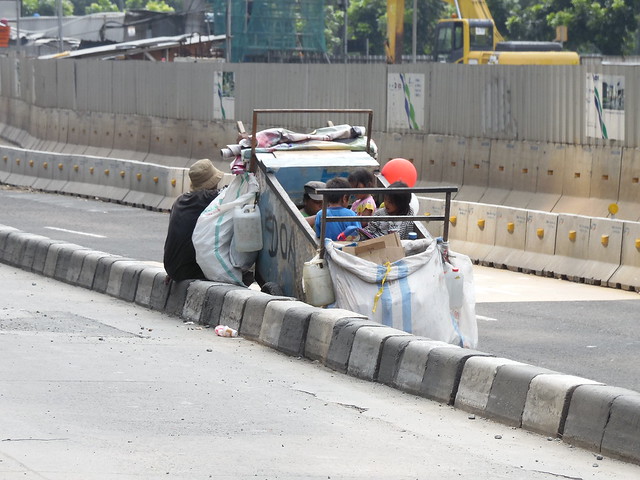
A shop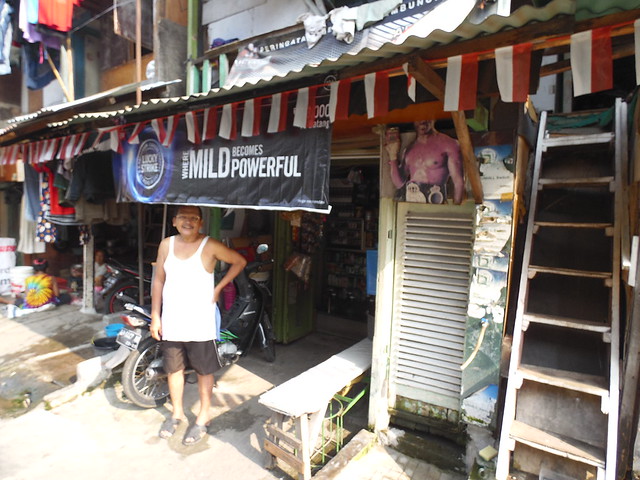
The stairs lead to a three story set of apartments inhabited by several families.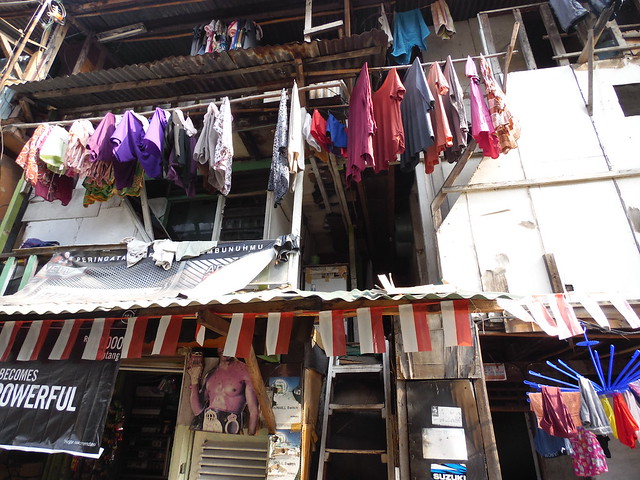
The hobos in America commonly followed the tracks.
I have a home, but the tracks are full of life so commonly make interesting places to visit. You'd be amazed at what you see and the nice people you meet.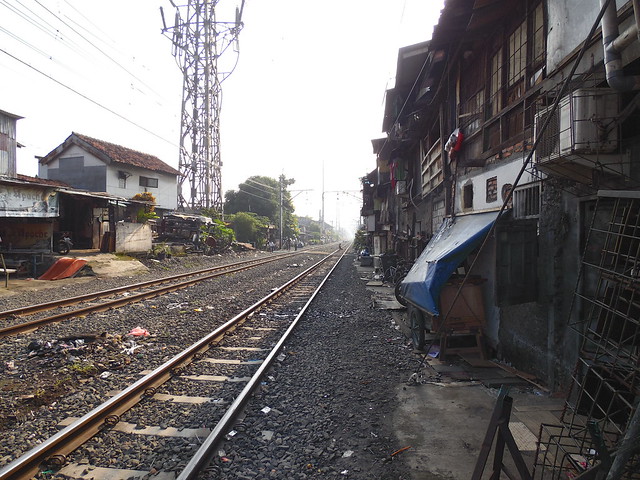
Te houses tend to be compact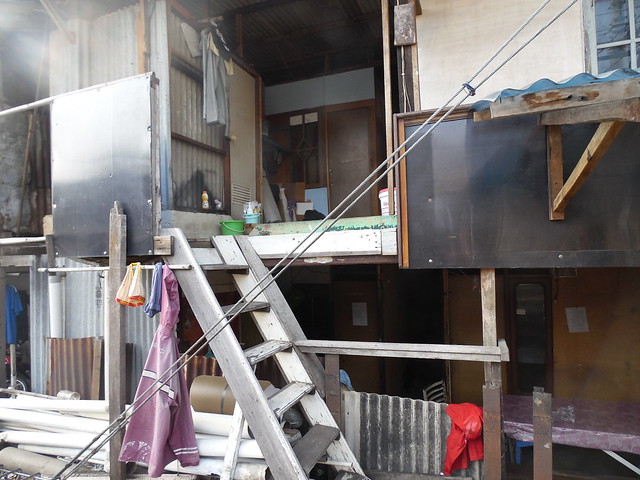
but many a small business is run from these places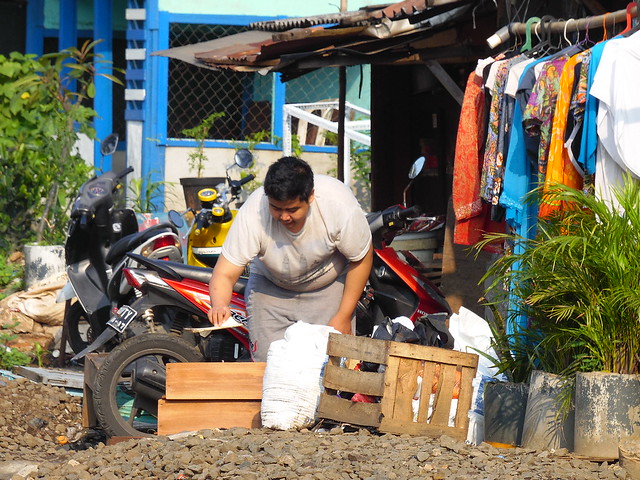
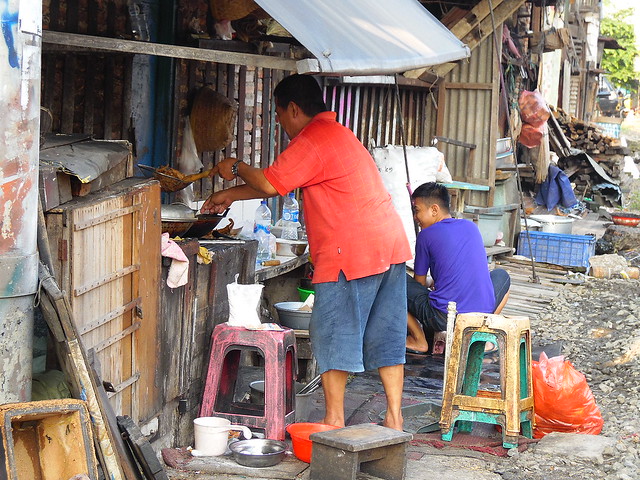
People, including small kids, walk on the tracks.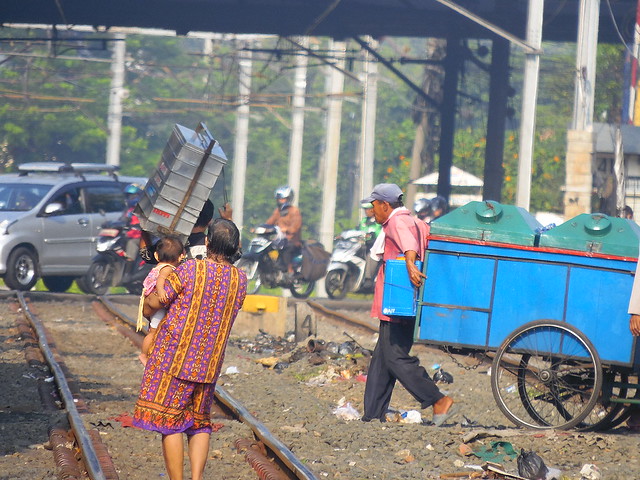
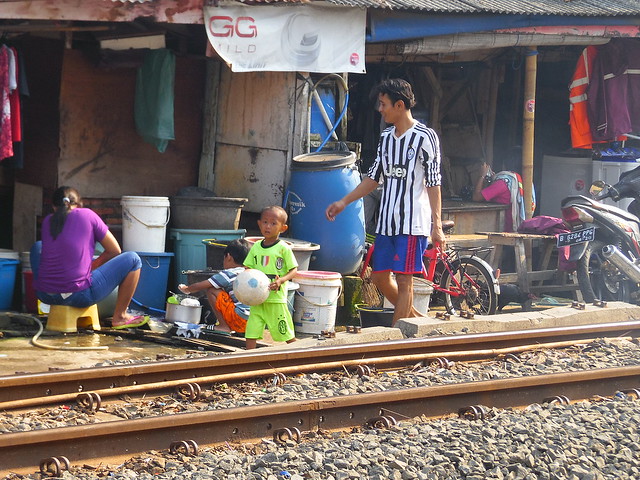
but trains are a serious danger as they travel at great speed and are surprisingly quiet until they get close .. and they get very close.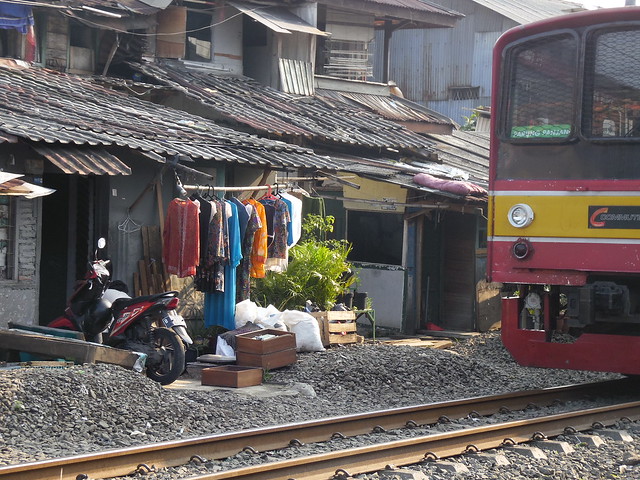
It can be difficult to imagine how dangerous the trains are, so I took a little video of one when a few kids invited me into their garden to avoid one.
https://www.youtube.com/watch?v=UadnaDj … e=youtu.be
You may recall the photos of the old building in Bintaro that collapsed, leaving a pile of rubble, a big mess, a closed main road, and a serious headache for a lot of people.
How do you get rid of something that size without letting people enter a very dangerous structure?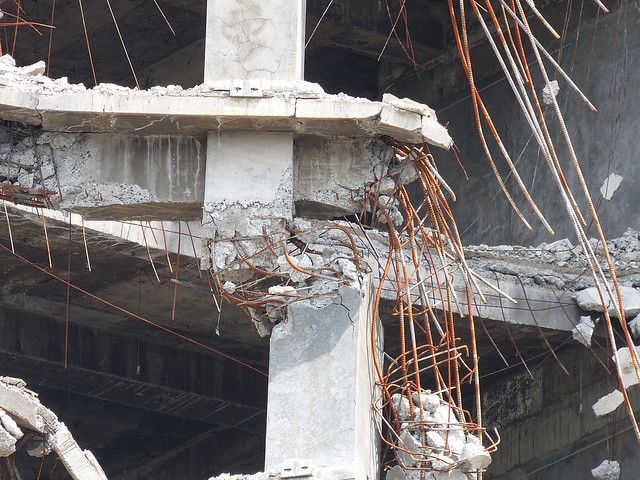
They think they have a solution.
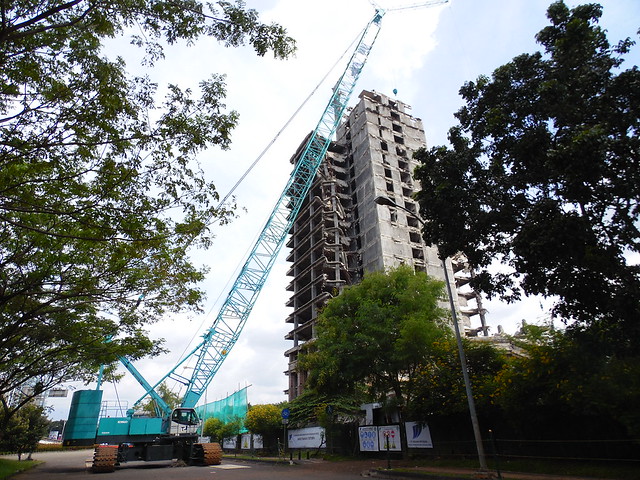
I wandered into Central Java, a wonderful place and an area I've spent a lot of time in. I lived there for a couple of years, and still visit my old stomping ground when I get the chance as we have family and a lot of friends there.
When you go anywhere in this country, you're expected to take little gift back, and they really should be something specific to the place you've been.
Carica (Pro - Charika) is the big thing in Wonosobo (apart from tea and tobacco), so I took a look around for some. 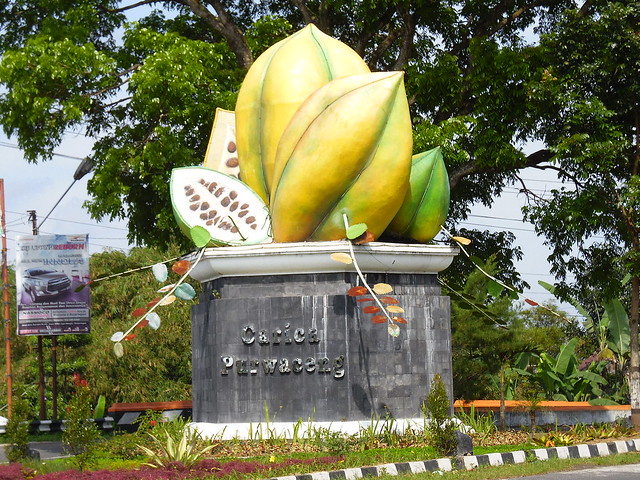
A very good friend who works there knows pretty much everyone, so he showed me the best place to go.
He knows a bloke who runs a local factory, so we went to visit.
Turns out the owner is a great bloke, so we ended up chatting for ages before I bought a few boxes of the stuff.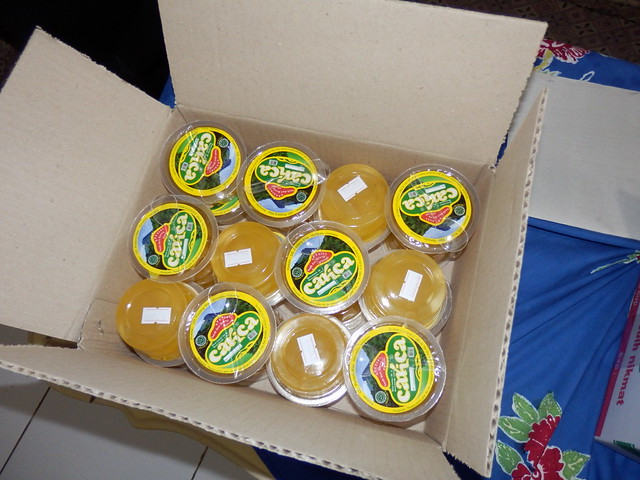
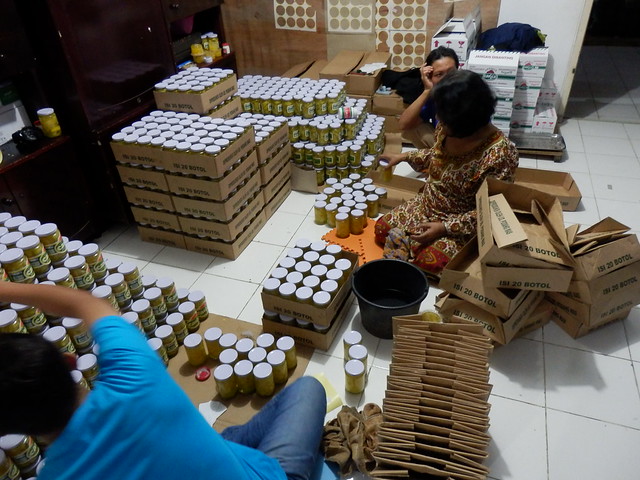
Th return leg was a bit much after a hard few days, so we stopped at a small hotel in Purwokerto so I didn't have to night drive. I wanted to get home for Saturday morning, but I more wanted to get home without crashing, hence the hotel.
The parking bloke has pets.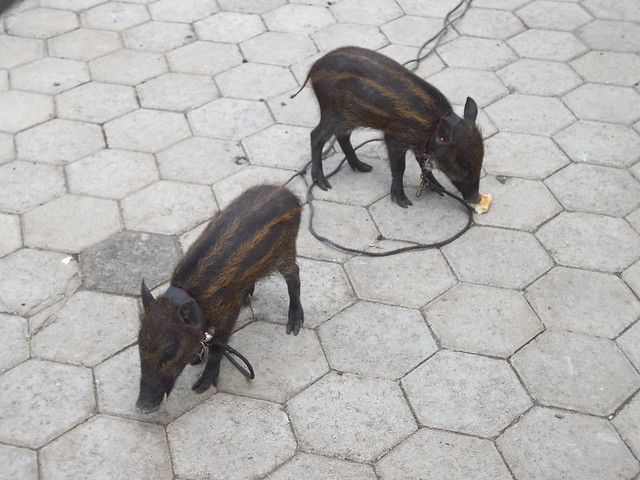
That building that fell down in Bintaro is being demolished bit by bit.
They've put netting up so as little as possible falls onto the roads.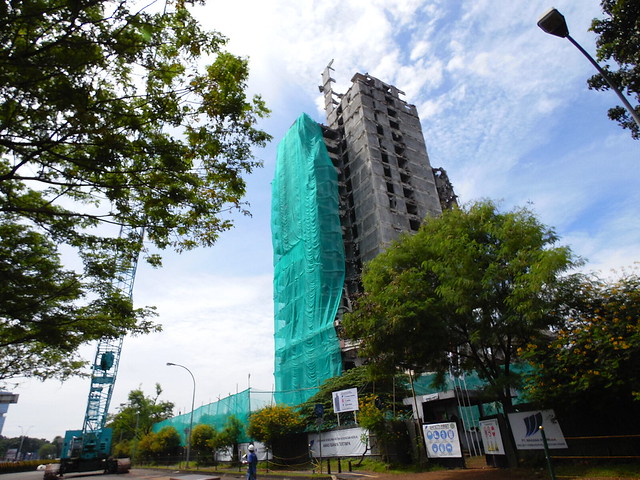
Articles to help you in your expat project in Indonesia
 Working in Bali
Working in BaliThe multi-faceted island of Bali offers many opportunities for those who wish to move from tourist to ...
 Driving in Indonesia
Driving in IndonesiaTraffic in Indonesia can be very overwhelming, particularly since the discipline and road conditions can ...
 Having a baby in Indonesia
Having a baby in IndonesiaIf you are about to have a baby in Indonesia, you should be aware that the medical services available to pregnant ...
 Moving to Indonesia with your pet
Moving to Indonesia with your petMoving to Indonesia with a pet is not a risk-free operation, mainly due to stray animals and rabies. ...
 Accommodation in Bali
Accommodation in BaliIf you are planning to relocate to Bali, housing is a critical part of your project. So how to find your ...
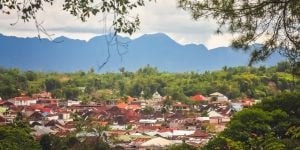 Accommodation in Indonesia
Accommodation in IndonesiaMany of the expatriates living in Indonesia prefer renting accommodation owing to the generally limited ...
 Buying property in Bali
Buying property in BaliShould your experience as an expatriate in Bali make you want to settle down permanently, you might want ...
 Internships in Indonesia
Internships in IndonesiaDo you wish to acquire hands-on experience, gain new professional skills and expand your international ...
Find more topics on the Indonesia forum

